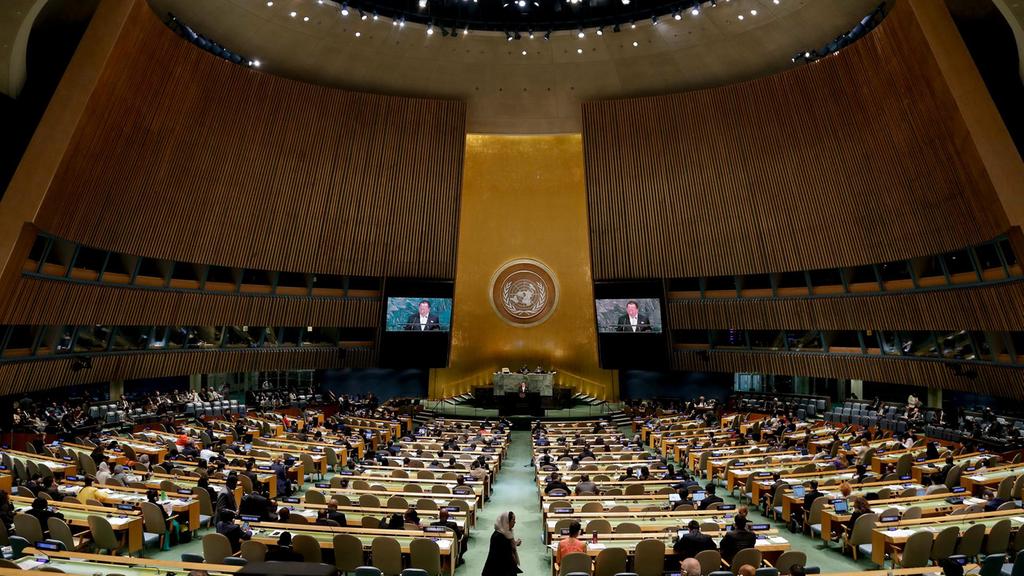Article

Beyond the protocol and the preening, the tedium and tantrums, what happens in the UN matters to all
The organisation might not be perfect but no one has come up with a better idea for global co-existence or the challenges facing humanity.
This week the world’s diplomats are gathering once again in New York for the annual jamboree of statecraft, the UN General Assembly.
They do so against a challenging backdrop, as its critics ask: what role is left for diplomacy amid the rubble of Syria? Or when Russian agents face no penalty for leaving lethal traces of Novichok nerve agent around the English countryside? Or when the US president prefers the increasingly adversarial arena of Twitter to the back rooms of the UN?
Diplomats often ease the path for states to release their grip on those bits of their authority that need to be surrendered if we are to live, work and create better together as humans – not a popular role in a populist moment. And if states themselves are becoming victims of the widespread crisis of trust, who needs their representatives?
Despite being hosted in the city that never sleeps, the UN can feel pretty low-octane. The rooms have too little air and the speeches too much of it. But away from the podium, it is diplomatic speed-dating: plenaries, pull-asides and photo opportunities; bilateral summits and brush-bys; grins and grimaces.
The UN might not be perfect. Yet beyond the protocol and preening, the tedium and tantrums, what happens in those corridors really matters to all of us. No one has yet come up with a better idea for global co-existence and we have subcontracted to the UN many of the biggest challenges facing humanity.
This year the UN gathers, having buried two of the world’s most inspirational diplomats, senator John McCain and former UN secretary general Kofi Annan. Their lives and decisions were not always perfect but their stories stood for something beyond narrow personal ambition or national interest.
Having experienced the horror of war, McCain was a huge advocate for an international system built with such patience and sacrifice that it would reduce the chances of future conflicts. Having suffered torture, he was its most compelling and articulate critic. Having helped make America great, he knew that responsibility to be more than a soundbite.
Annan was the architect of the sustainable development goals. But for me, his supreme diplomatic achievement was in the aftermath of the Kenyan elections in December 2007. He was patient, humble and – a much underrated diplomatic quality – stubborn in pursuing a political agreement that could stop violence. He was also tireless. I remember him calling at 5am on New Year’s Day when I was working for then British prime minister Gordon Brown.
In a digital age, it is easier to disrupt than to build. Like every other profession, diplomacy is being challenged by technology. And it has to fight its corner.
But what McCain and Annan reminded us all was that we could still build networks in a time of institutional failure; consensus in a time of arguments; and bridges in a time of walls. We can still strive for expertise, patience, perspective and judgment in a time of fake news, soundbites and echo chambers.
We can still aspire to be courageously calm, tolerant and honest in a time of outrage, intolerance and "post-truth" politics. We can be internationalist in a time of nationalism and open-minded in a time of closed minds. Above all, we must remain curious in a time of too much certainty.
So diplomacy doesn’t die with diplomatic greats like McCain and Annan.
I saw that in preparations for tomorrow’s Global Tech Panel in New York, where we are bringing together government and technology leaders to tackle the new frontiers of diplomacy, including how to create jobs and growth across the Middle East and how to update international rules to govern artificial intelligence, autonomous weapons and automation.
I saw it this month in the excitement and passion of new students at the Emirates Diplomatic Academy, eager to learn and put the craft into statecraft.
And most of all, I heard it in the messages from my sons’ teachers at the start of the school year, as they spoke about the need to be curious, kind and brave in finding ways to live and work together. These are the essence of diplomacy. But much more importantly, they are the simple but vital life skills that will keep humanity moving forward.
What might McCain and Annan have told those young learners? Well, I keep a book of advice for my son from inspirational figures. Both men were kind enough to take the time to write in it.
Annan’s advice was to “study hard, travel widely, learn about other cultures, listen to people but find your own path”.
And McCain wrote his advice in Downing Street, during a visit when he was running for president: “Dear Charlie, there is no greater vocation than to serve. But there is no greater purpose than to love. Live a life that does both, and you’ll be truly happy.”
Don’t write off diplomacy just yet.
Photo description and credit: The UN is not perfect but it might be the only tool we have for global co-existence. Julie Jacobson / AP

